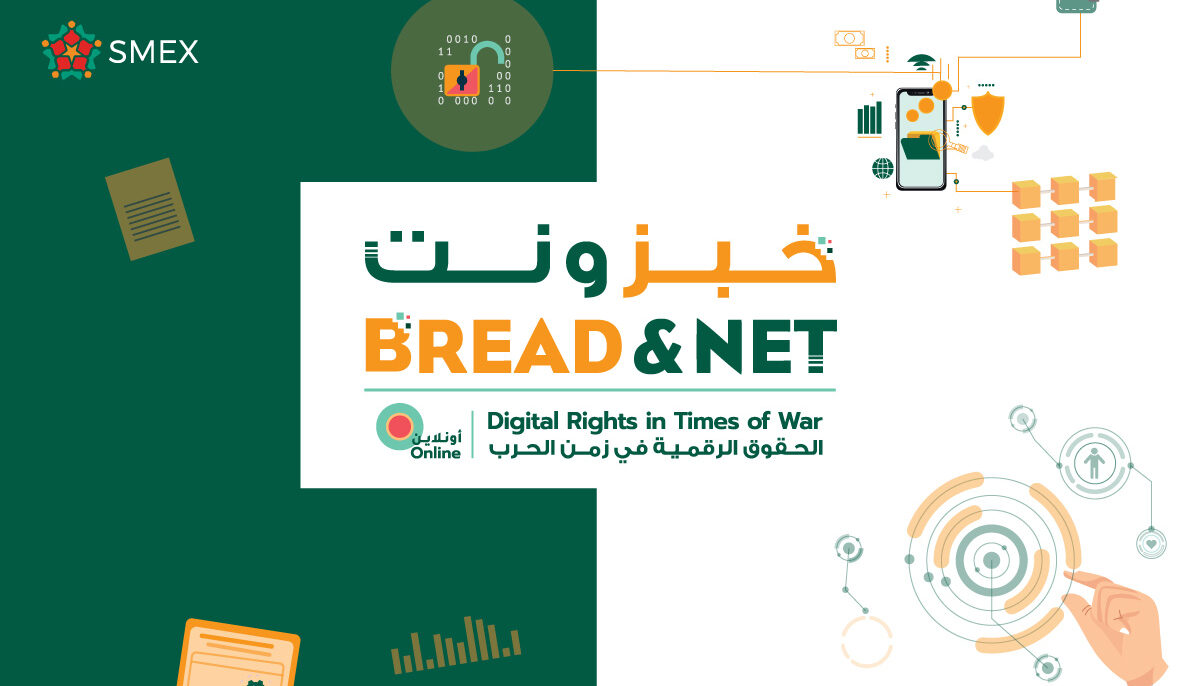Last Wednesday, we concluded Bread&Net – Online: Digital Rights in Times of War, where we invited participants from West Asia and North Africa to address some of the most pressing digital rights issues that emerged over the past year.
Reflecting on the insights shared during the event, it is evident that the conflict-driven humanitarian crises in the region have heightened the urgency of addressing digital rights. The fighting between the army and the RSF in Sudan has pushed the country to the brink of famine, and more than half the population in Yemen has become in dire need of assistance after ten years of war. The Israeli occupation is committing mass genocide in Gaza, while simultaneously bombing towns and villages in South Lebanon every day.
During Bread&Net, journalists and activists shared their experiences of unconventional yet dangerous reporting and advocacy in conflict zones, as mobile devices have become lifelines for communications and documenting human rights violations and war crimes.
Censorship on social media platforms and the bombing of communications infrastructure have not only curtailed rights and freedoms but also endangered the lives of millions. At the same time, increased state investment in spy technology has led to heightened surveillance of activists and journalists across the region, resulting in intimidation, arrests, and even executions.
In an effort to address these persisting setbacks, SMEX introduced two recent opportunities dedicated to advancing digital rights scholarship and advocacy in our region, including the Digital Rights Fund (DRF) and the Mariam Al-Shafei Fellowship on Technology and Human Rights.
“It is important to come together as members of the digital rights community to brainstorm, exchange ideas, and discuss the most prominent digital rights issues, especially in the current time of war,” emphasized Mohamad Nahjem, executive director at SMEX.
Discussions and Outcomes
Content Moderation: Suppressed Voices in Our Region
Content moderation policies on social media platforms were a major focus during the sixth edition of Bread&Net. These policies have posed significant challenges for millions of users, especially in Palestine, who are striving to express their opinions, seek assistance, and share their stories.
“Meta relies on automatic content moderation mechanisms in 80% of its content moderation activities,” said Marwa Fatafta from Access Now. “We are now facing algorithms incapable of understanding neutrality and diversity.”
Rasha Younes from Human Rights Watch also emphasized the need for “better transparency from social media-owning companies like Meta and X regarding content moderation mechanisms and how they are used, in addition to the need for a human touch.”
Participants had the opportunity to engage with members of the Oversight Board, Khaled Mansour and Nighat Dad, who thoroughly discussed content management challenges, particularly in relation to Palestine.
The guests stressed the need to “demand that Meta publicly and transparently disclose its list of dangerous individuals and organizations, as content moderation policies are now affecting news, jokes, and different content types.”
Frequent Internet Shutdowns
In 2023, internet shutdowns became a recurrent phenomenon in many countries across the region, justified by various pretexts such as war, elections, preventing cheating in exams, and maintaining security by preventing protests. While governments were primarily responsible for these shutdowns, there were instances where external parties intervened to trigger the internet ban, as seen in Palestine.
“In 2023, the internet was shut down 283 times in 39 countries worldwide,” according to one speaker. In the Middle East and North Africa alone, “the internet was cut off 77 times in 15 different states, and 16 of these incidents were imposed by the Israeli occupation in Palestine.”
Both speakers and participants expressed concern regarding this reality, especially in light of the consecutive crises sweeping the region. Speaking about Sudan, for example, where battles are intensifying between the army and the Rapid Support Forces, Marwa Fatafta stressed that “we are witnessing the worst humanitarian crisis of our time, while telecommunications and internet service providers are subjected to repeated attacks.”
Spyware: Pegasus Is Not Unique
In recent years, the term “spyware” has become frequent among civil society circles, especially after uncovering the Israeli NSO Group and its Pegasus malware, which targeted a significant number of journalists, activists, and political figures.
Governments in the region, namely Saudi Arabia and the UAE, stood behind many espionage campaigns and interceptions targeting users in the region. As discussed across multiple sessions, these governments exploited surveillance software as tools that consolidate their dictatorship and control.
Speakers conveyed their concern regarding the direction these authorities are taking, noting that they undoubtedly possess the necessary resources to purchase, develop, and deploy such software against their citizens and abroad. This concern is further compounded by the adaptability of spyware technology. As one speaker warned: “Every time spyware is publicly discovered, the producing company rushes to change its form.”
SMEX’s Digital Rights Fund and the Mariam Al-Shafei Fellowship on Technology and Human Rights
Bread&Net devoted one session to introducing participants to the “Digital Rights Fund for the West Asia and North Africa Region” with the aim of empowering individuals, institutions, and informal groups to effectively overcome digital rights threats and violations.
Two fellows from the Mariam Al-Shafei Fellowship on Technology and Human Rights 2023, Ameni Saidani and Hanaa Dany, presented their research and shared their experiences in the program. The audience also heard the testimonies of new SMEX fellows for 2024.
We are always pleased, at Bread&Net and SMEX, to provide an open virtual space that brings together digital rights activists and enthusiasts from the region to discuss such topics, their manifestations, their results, and strategies to move forward.
We thank all the speakers, participants, and team members who spared no effort in making the sixth edition of our forum a success. Your presence with us this year and every year is what truly makes Bread&Net a welcoming platform for everyone, and one with significant impact on our presence in both real and digital spaces.
Don’t forget to subscribe to our monthly newsletter and follow Bread&Net on X, Instagram, and Facebook to stay up to date with all developments and upcoming events.
We were overjoyed with your presence and participation, and we would like to remind you that in case you missed a session, you will be able to watch it in full on SMEX’s YouTube channel soon.
Thanks again and see you soon in Beirut!




